Last summer, before my senior year of college, I spent a month living with my cousins. Because I had an all-encompassing meal plan at school and my parents cooking for me at home, this was my first foray into the land of feeding myself. I’d be planning my own meals, buying my own groceries, and completely controlling my own nutrition. Excited by my newfound independence, I marched to Trader Joe’s and stocked up on granola bars, frozen dinners, and sour gummies. When my first cousin once removed (read: aunt) saw my grocery haul, she chuckled and said, “You eat like a kid!”
She was right. I love all those foods, but they were the only options in my repertoire. I knew that something had to change. I decided that after college I would start eating like an adult. I would learn how to cook.
Now, I’m about four months into consistently cooking for myself, and I’m honestly shocked at how quickly I’ve become competent in the kitchen. I can’t pretend to be an expert, but I would definitely call myself, at this point, a home cook. I even have the scars to prove it!






If you’re trying to make that transition too, you might be wondering where to even start. It can feel really overwhelming, but just like any other skill, it’ll only get easier as you go. Not to mention, cooking can be really fun.
Here’s everything I’ve learned in the past few months—a how-to guide on building the life skill of cooking, from someone who very recently did exactly that.
Part 1: Setting up your kitchen
I’m not going to spend a ton of time here, because you can find about ten zillion buying guides for kitchen supplies online. Here are a few.
My advice, though, is not to get too precious about this. Just get whatever is in your budget. It’ll be fine.
And if buying every little gadget that you supposedly “need” is too expensive and overwhelming, here’s what I would prioritize:
Things you absolutely need: A large pot with a lid. A medium sized pan. A chef’s knife. A cutting board. Some sort of wooden spoon. Some sort of scooper. A can opener.
Things that would be very helpful: A spatula. A large pan. A small pot with a lid. Paring knives. A vegetable peeler. A colander/strainer. Mixing bowls. A whisk. A sheet pan. Measuring cups. Measuring spoons. A knife sharpener.
Things that are nice, but you can live without them: A blender or an immersion blender. A casserole dish. Tongs. A liquid measuring cup. A medium pot with a lid.
A note on pans: cast iron is great and cheap (and you can wash it with soap). Non-stick is nice but you have to be careful not to use it with metal utensils and not to put it over heat when it’s empty.
A note on storing food: Tupperware is an absolute must if you’re cooking for yourself. It is surprisingly expensive, though, and I’m a big believer in reusing single-use food packaging to fill the same purpose. For example:
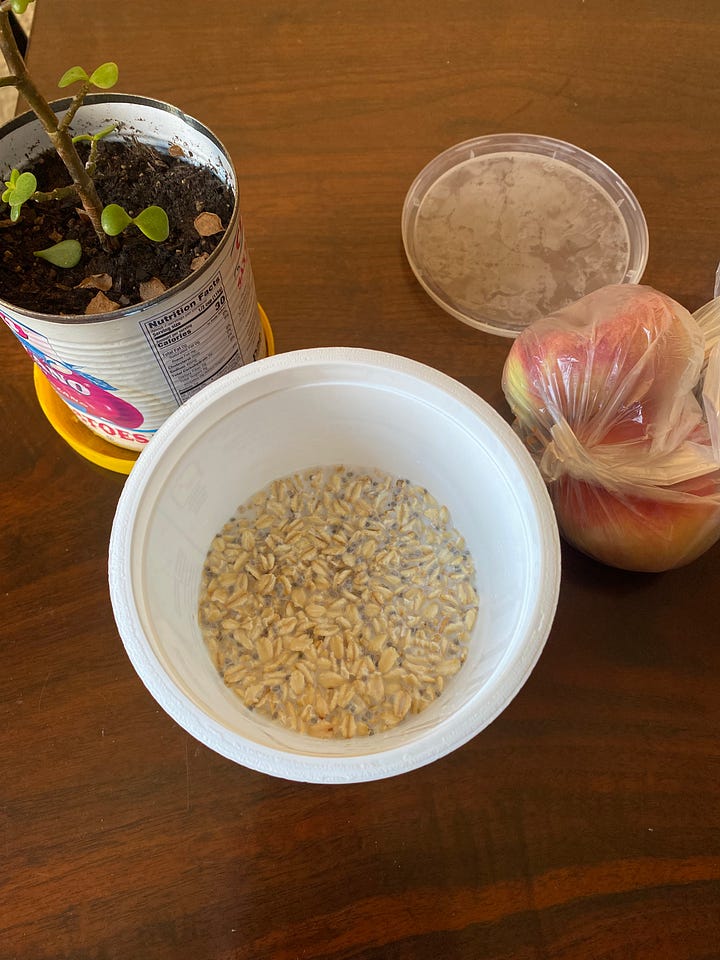
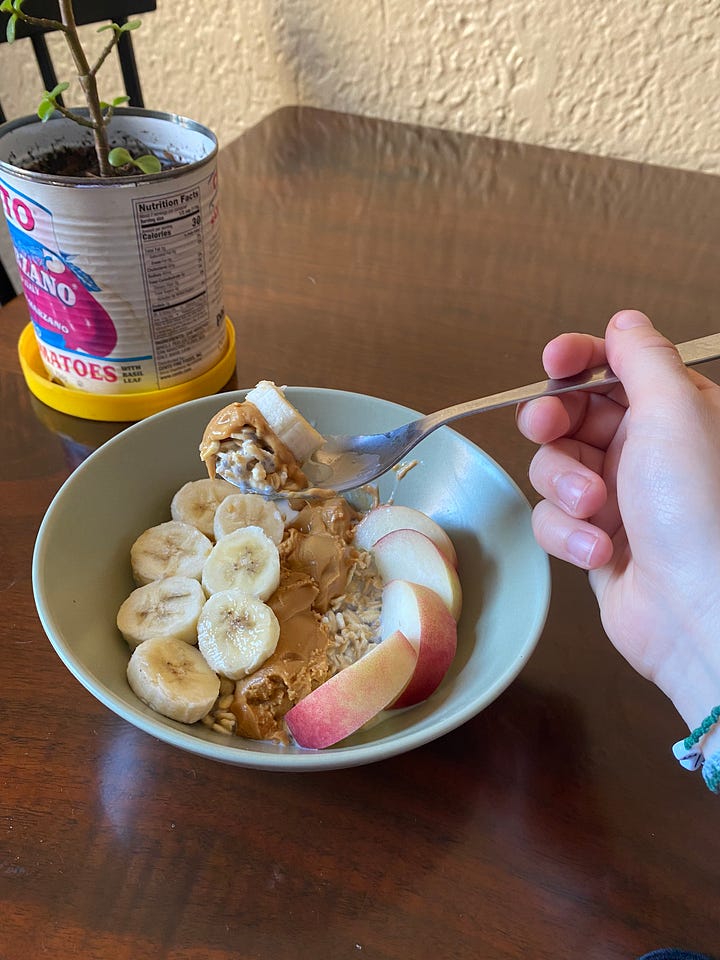
Part 2: Planning your meals
This is not the glamorous part, but it’s not as big of a hassle as it might seem. You just have to take fifteen minutes and do it. I usually do my planning on Sundays.
Generally, I think a good rule of thumb is to plan three dinners for the week. I prioritize meals that will leave me with leftovers and that will use things I already have.
I work at a cafe and usually get free lunch at work, so my leftovers from three dinners are more than enough to get me through the week. All the same, I like to have an easy lunch option just in case, and some Hail Mary dinners, like this beauty:
If you don’t get food at work, I would recommend having at least two easy lunch items to cycle between.
I usually stick to one breakfast for the whole week. 90% of the time that’s Greek yogurt for me, but I’m giving overnight oats a trial run right now.
A sample “menu” for the week:
Breakfast: overnight oats
Lunch 1: refried bean and cheese tacos
Lunch 2: PB+J
Dinner 1: lentil soup
Dinner 2: burrito bowls
Dinner 3: tofu stir fry
When I’m looking for recipes, here’s what I consider (aside from the obvious “do I want to eat this?”):
Can I use what I already have? For example, if I have celery, carrots, and lentils left over from last week’s lentil soup, maybe I should make lentil soup again this week. Or, if I have half a head of cabbage sitting in my fridge, what can I do with that? Maybe I should make some coleslaw, or include cabbage in a stir fry.
Will I be able to use these ingredients in other dishes? I don’t want to buy a big bag of something that I’m never going to use again. I like to focus on recipes with versatile ingredients, like onions, potatoes, garlic, beans, etc. And if I’m buying something just for one specific recipe, I want to make sure the recipe will use all of it.
Am I getting enough protein? If you eat meat, that’s probably an easy question to answer. As a vegetarian, though, I like to make sure at least two out of my three dinners have a really clear protein source: tofu, or lentils, or beans and rice, or something like that.
Will I have leftovers? I know that lentil soup will treat me well throughout the week (lately I’ve been making it pretty much every week). And I know that, while a stir fry might give me two meals, a salad is almost always a one and done. I try to make sure that I have no more than one fleeting meal a week. I want a fridge full of leftovers!
A note on finding recipes: I don’t have some big secret for you. Nine times out of ten, I think to myself, “huh, I have carrots that I need to get rid of.” And then I google “recipes with carrots.” If I were to point you in a specific direction, I do think that Reddit is a great source for easy recipes. Budget Bytes can also be helpful.
If you eat out occasionally, you could probably drop down to two planned dinners a week. If you’re cooking for multiple people, you might need to bump up to four.
If I had to sum my eating habits into a formula, it would probably be this:
1 soup + 1 grain bowl thing + 1 fun recipe = 1 week of food
By “fun recipe,” I mean something that’s a break from routine. Like, for example, my attempt to recreate the peanut butter noodles I got with friends a few weeks ago. Or the spring rolls my friend recommended. Or, frankly, last week’s entire scape adventure.
This is what works for me, at least for now. I still have snafus from time to time, where I buy too much or too little food. It’s an art, not a science. It might take a few weeks or months to dial in what works for you. But I believe in you!
Part 3: Buying groceries
This week, I spent $43.50 on groceries. I’m very proud of that. Here’s what I bought:
I usually go to the grocery store on Monday, which is when I usually run out of last week’s leftovers.
To keep expenses down, I shop to recipes. Once I plan my week’s meals, I make a list of ingredients I’ll need. I like to estimate how much my list will cost, both to keep me from stumbling blindly into an over-budget grocery haul, and also because it’s a fun game to see how close I can get.
Personally, I prefer writing my list on paper, but phones work too. I do think having a list is crucial if you want to run a tight ship. Groceries can be alluring.
A note on alluring groceries: don’t shop hungry.
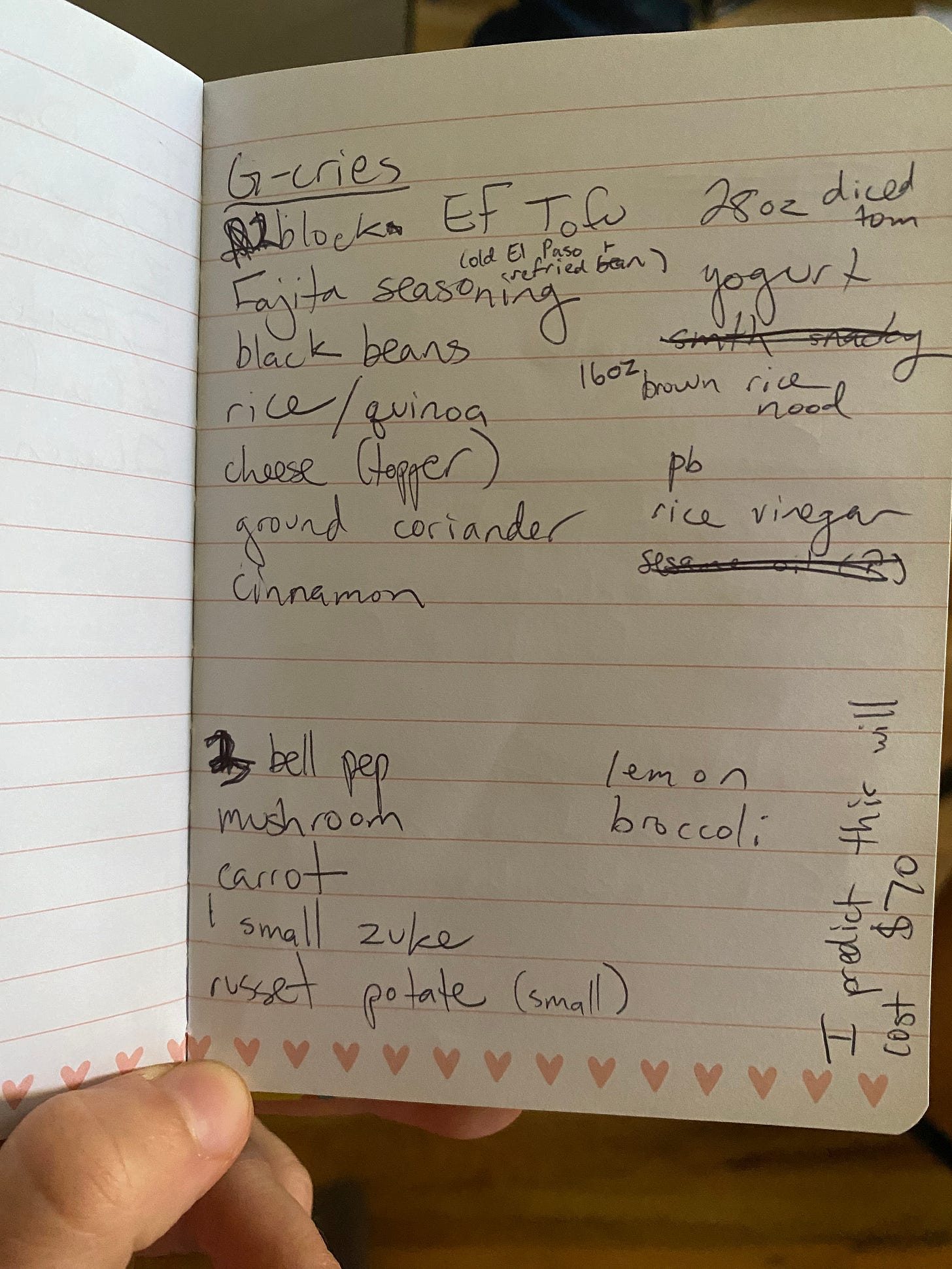
Some things to bear in mind:
You can absolutely make substitutions in recipes. If a recipe calls for red wine vinegar, but you already have white wine vinegar, you can probably just use white wine vinegar. And if a recipe calls for maple syrup, but you already have honey, you can probably just use honey. Etc etc. Relatedly, I was going to make burrito bowls with spinach in them this week, but I realized that I was already buying beets and could just use the beet greens! There are a lot of small adjustments like that that can limit your waste and spending.
Your first few grocery trips will be expensive. Pantry staples can be hard on the wallet, especially if you’re buying a bunch at once. You won’t need to buy them often, though, and once you have your kitchen up and running with everything you need, your grocery trips will be cheaper.
Don’t buy anything unless you have a plan for it. Or do, I’m not your boss. But nothing makes me sadder than watching an ingredient languish because I bought it without thinking it through.
Part 4: Actually cooking
Honestly, I think the name of the game here is to learn by doing. Don’t be scared. Don’t let yourself give up. And just give it a go.
A few tips I can impart:
Especially when you’re a new cook, give yourself more time than the recipe says. Personally, I’m a slow chopper, and it always takes me two or three times longer than the recipe says to prep my ingredients (because the recipes are usually tested by professionals). Not a big deal as long as I plan for it.
Listen as you cook. Don’t play music or a podcast. The sounds are important to tell you if you need to adjust the heat or if something is ready (e.g., loud sizzling probably means you should turn down the heat. Depending on what you’re going for). Smells are also important. So, basically, pay attention!
Prep all your ingredients before you start cooking! Things can be time sensitive once heat is involved, so you don’t want to be fumbling around with ingredients when it’s time to add them.
Dirty dishes are a hassle, but only if you let them pile up. Do dishes as you go. If you have a dishwasher, I guess you don’t even have to think about them.
Don’t get too wrapped up in doing things “correctly.” Find what works for you.
A note on knives: maybe this is a me thing, but before I started cooking, I never would have reached for a chef’s knife. They just seemed kind of big and scary to me. Now, though, it’s basically the only type of knife I use, and I encourage you to use them! They’re so versatile and effective. There’s no need to be afraid (ironically, right after I wrote this, I sliced my thumbnail in half with a chef’s knife. Miraculously I didn’t actually cut my thumb, just the nail. So, don’t be afraid, but also be careful lol)
Part 5: Have fun :)
As you cook more, you’ll start to notice what you actually enjoy making. Not just eating, but making. I think it’s important to lean into the parts of the process that are fun for you. Cooking doesn’t have to be a chore!
I have the most fun cooking when it feels a bit like a science experiment, like when I made tofu from scratch. Or this Passover nut cake I made with my boyfriend (we ground the nut flour ourselves)!
Maybe you’ll enjoy cooking most when it’s visually artistic, or when you get to improvise, or when you grow the ingredients yourself.
It’s all low-stakes, so don’t be afraid to experiment and have fun. Because it really can be fun.




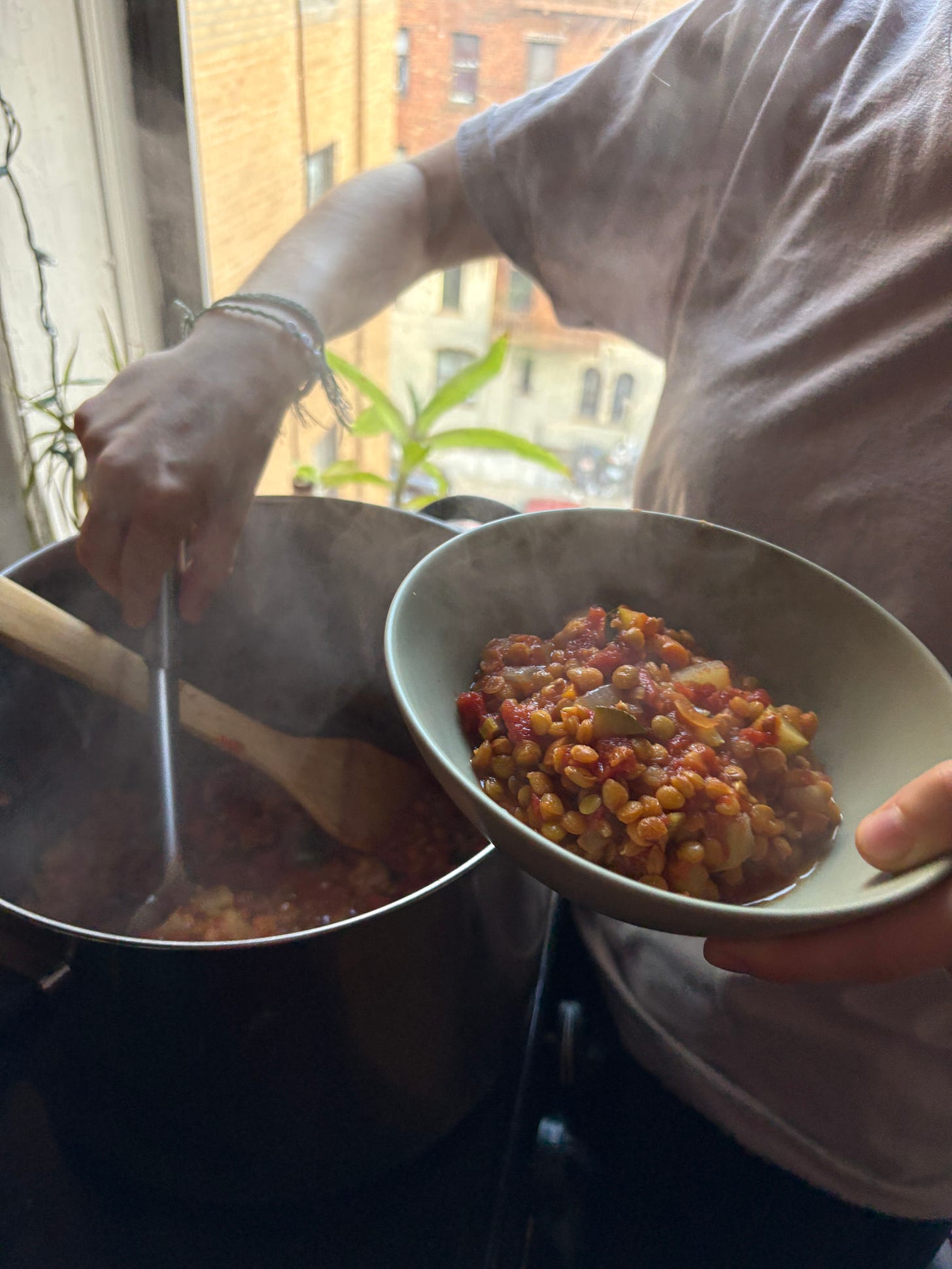


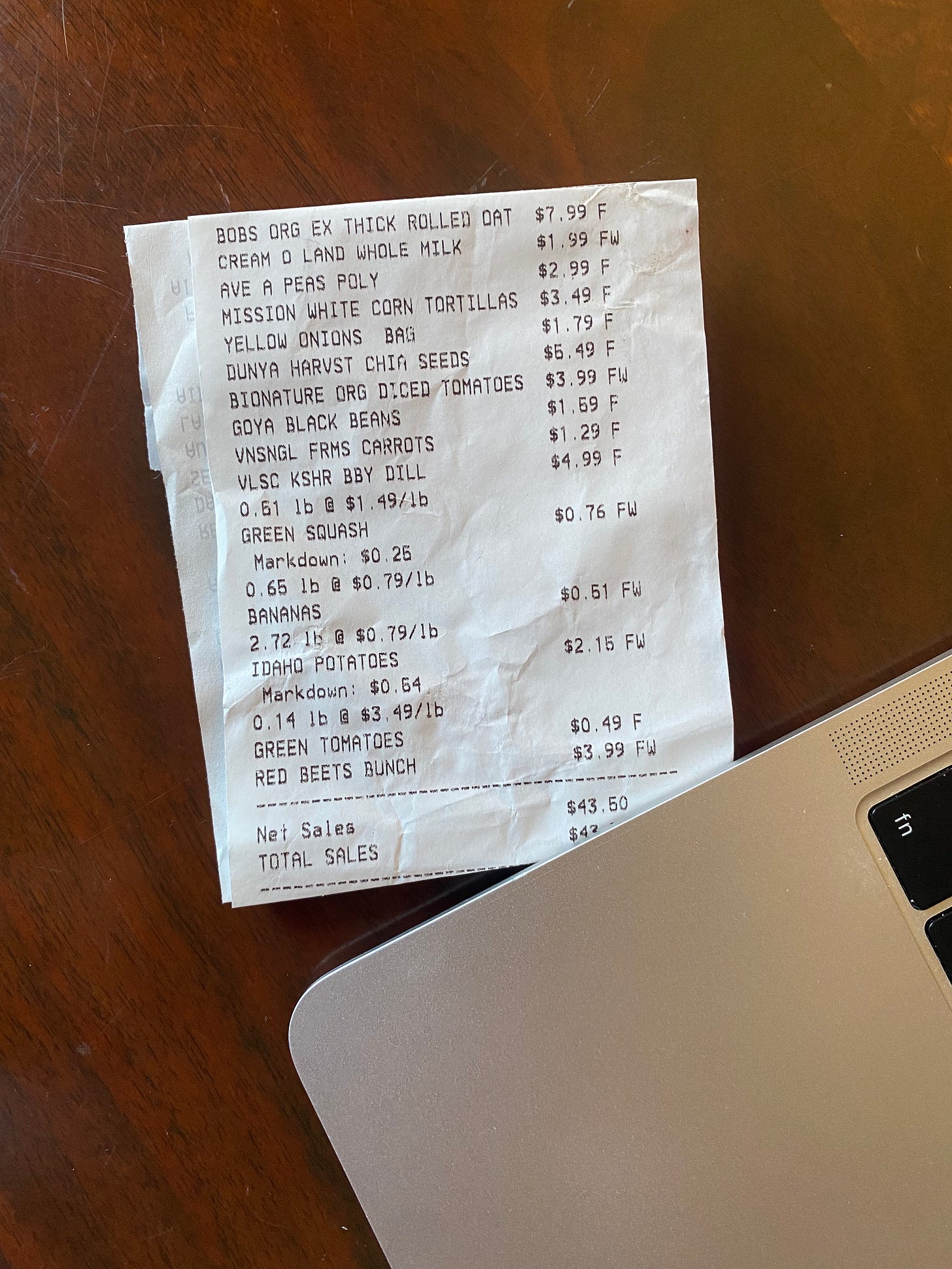
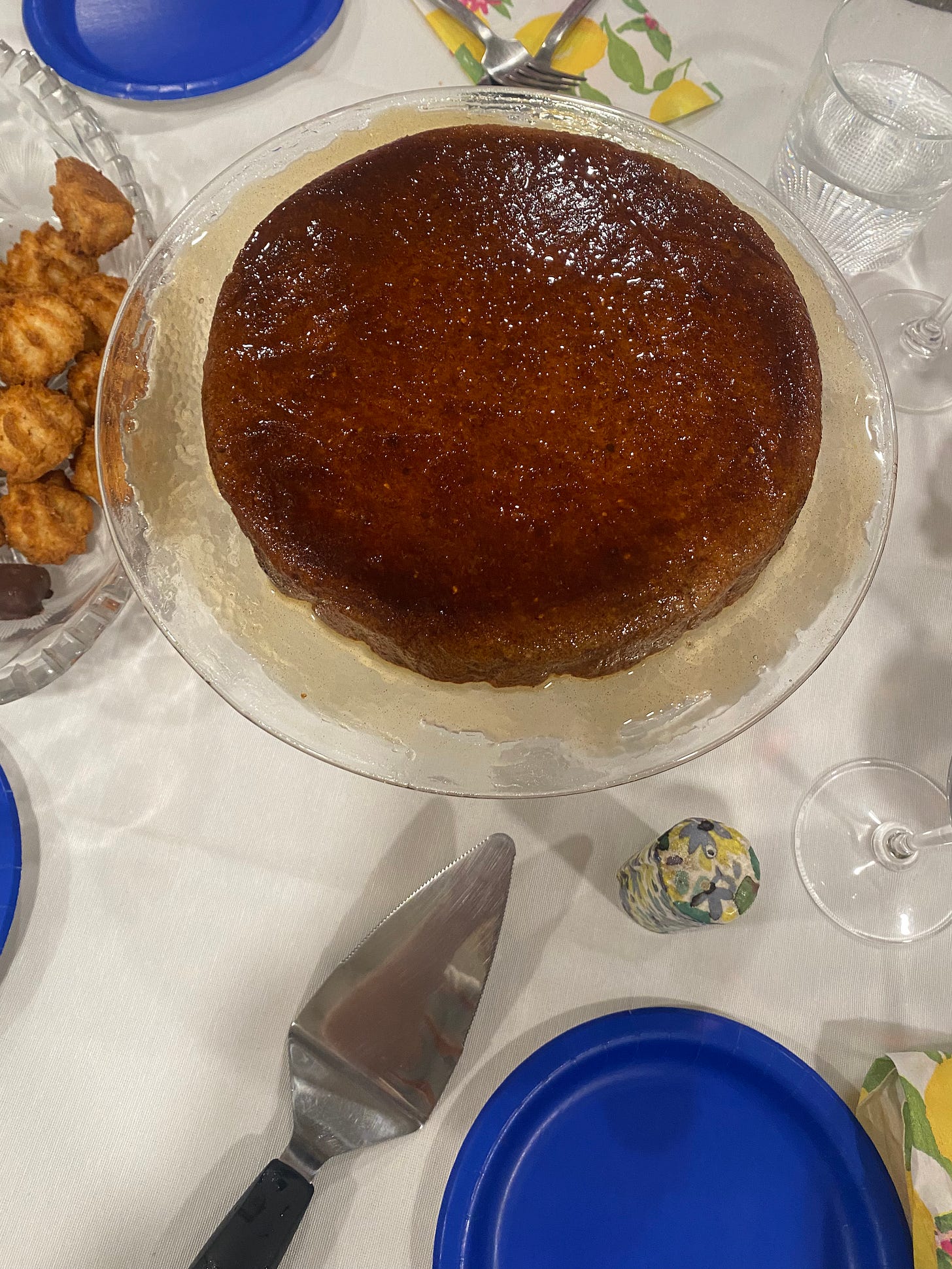
I love how you organize the information and make it seem approachable. Reading this inspires me to cook with less waste.
Inspiring post! Your determination and descriptions make me want to try cooking again!